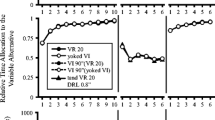Abstract
Variants of the differential reinforcement paradigm were investigated as a function of both present schedule of reinforcement and past reinforcement history. Results suggest that such differential reinforcement procedures are effective in both increasing new responses and decreasing old responses. Reinforcement history was found not to be a significant variable. Rather, present schedule of reinforcement was found to be crucial in the control of lever-press behavior, with children reinforced on a VR schedule responding at a higher rate than those on a VI schedule of reinforcement.
Similar content being viewed by others
References
BAER, D. M., & WOLF, M. 1970. Recent examples of behavior modification in preschool settings. In C. Neuringer & J. Michael (Eds.), Behavior modification in clinical psychology. New York: Appleton-Century-Crofts.
BANDURA, A. 1969. Principles of behavior modification. New York: Holt, Rinehart & Winston.
BISETT, B. M., & RIEBER, M. 1966. The effects of age and incentive value on discrimination learning. Journal of Experimental Psychology, 3, 199–206.
BRUNING, J. L. 1964. Effects of magnitude of reward and percentage of reinforcement on a lever movement response. Child Development, 35, 281–285.
COATES, B. A. 1967. The effect of social reinforcement on low verbal interaction in a nursery school child. Unpublished master’s thesis, University of Kansas.
FERSTER, C. B., & SKINNER, B. F. 1957. Schedules of reinforcement. New York: Appleton-Century-Crofts.
FOXWELL, H. R. 1966. The development of social responsiveness to other children in a preschool child through experimental use of social reinforcement. Unpublished master’s thesis, University of Kansas.
HAMILTON, M. L. 1972. Response to social reinforcement rates as a function of reinforcement history. Developmental Psychology, 6, 180.
HOM, G. L. 1966. Personal communication, 1964. Cited by Spradlin, J. E., & Girardeau, F. L. The behavior of moderately and severely retarded persons. In N. R. Ellis (Ed.), International review of research in mental retardation. New York: Academic Press.
JOHNSON, D.L., McGLYNN, F.D., & TOPPING, J. S. 1973. The relative efficiency of four response-elimination techniques following variable-ratio reinforcement training. The Psychological Record, 23, 203–208.
LEIBOWITZ, J.M. 1972. Relative efficacy of two variants of the differential reinforcement paradigm in elimination of undesirable behavior. The Psychological Record, 22, 37–47.
LEWIS, D. J., & DUNCAN, C. P. 1961. Effects of variable magnitude of reward on a lever pulling response. Journal of Experimental Psychology, 62, 203–205.
TOPPING, J. S., PICKERING, J. W., & JACKSON, J. A. 1971a. Omission training effects following VI and FI pretraining. Psychonomic Science, 24, 113–114.
TOPPING, J. S., PICKERING, J. W., & JACKSON, J. A. 1971b. The differential effects of omission and extinction following DRL pretraining. Psychonomic Science, 24, 137–138.
TOPPING, J. S., PICKERING, J. W., & JACKSON, J. A. 1972. Comparison of omission and extinction following Fr reinforcement training. The Psychological Record, 22, 221–224.
WEINER, H. 1964. Conditioning history and human fixed interval performance. Journal of the Experimental Analysis of Behavior, 7, 383–385.
WEINER, H. 1965. Conditioning history and maladaptive human operant behavior. Psychological Reports, 17, 935–942.
WEINER, H. 1969. Controlling human fixed interval performance. Journal of the Experimental Analysis of Behavior, 12, 349–373.
WEISBERG, P. 1970. Effects of reinforcement history on timing (DRL) performance in young children. Journal of Experimental Child Psychology, 9, 348–362.
WINER, B. J. 1962. Statistical principles in experimental design. New York: McGraw-Hill.
Author information
Authors and Affiliations
Additional information
This work was supported in part by Project 917, Division of Maternal and Child Health Services, U.S. Department of Health, Education and Welfare, awarded to the John F. Kennedy Institute, The John Hopkins University School of Medicine, and in part by Project 405, Division of Maternal and Child Health Services, U.S. Department of Health, Education and Welfare, awarded to the C. Louis Meyer Children’s Rehabilitation Institute, The University of Nebraska Medical Center.
Rights and permissions
About this article
Cite this article
Leibowitz, J.M. Differential Reinforcement Effectiveness as a Function of Schedule of Reinforcement and Reinforcement History. Psychol Rec 25, 343–354 (1975). https://doi.org/10.1007/BF03394326
Published:
Issue Date:
DOI: https://doi.org/10.1007/BF03394326




